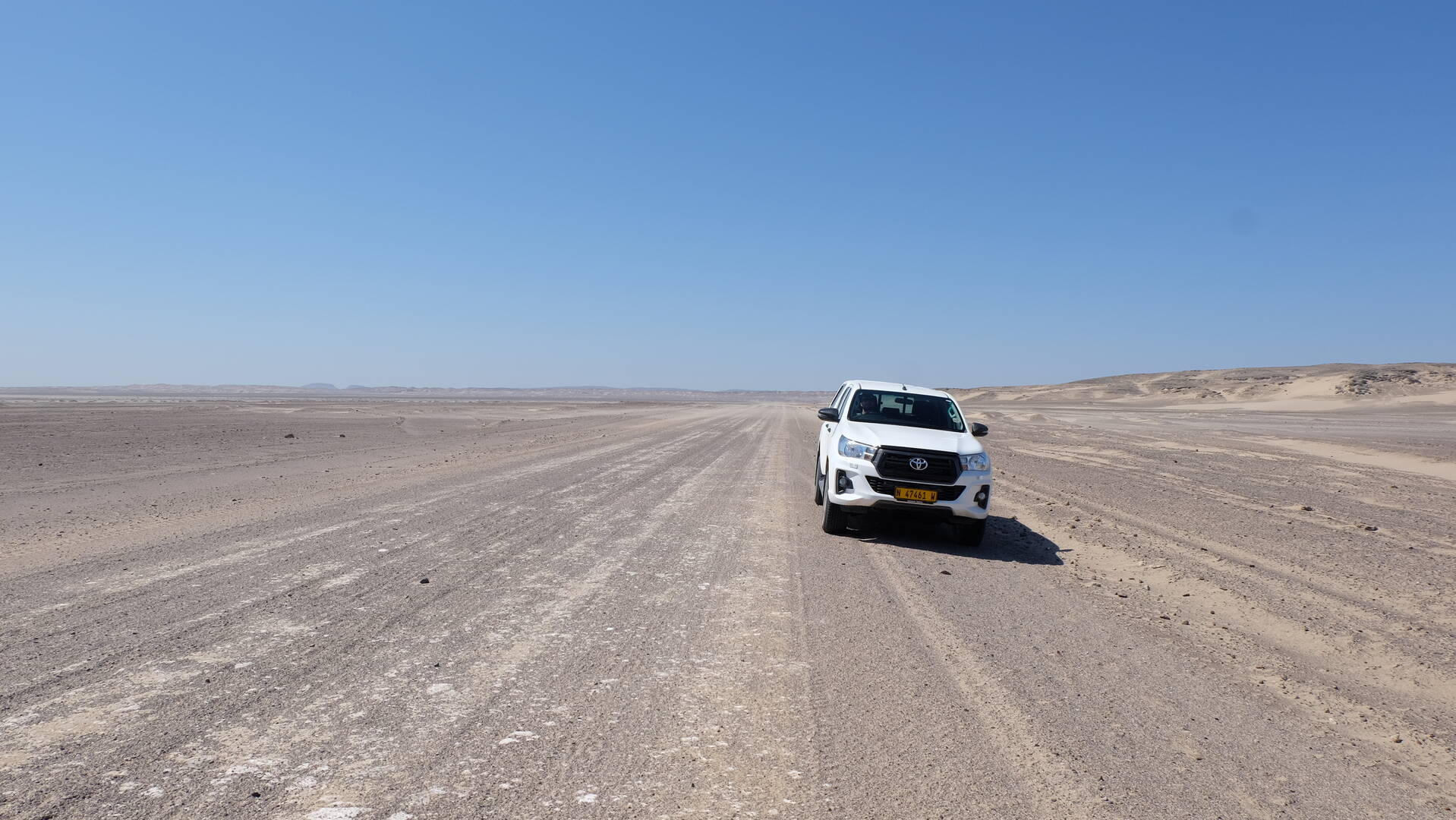Self-drive - Car types
Car types explained

Which car to hire: ground clearance
The first decision to make is a choice between:- A normal car with lower ground clearance . Saloon cars for hire in Namibia include the Toyota Corolla, which is classed as a Group C on our car hire groups page.
- A vehicle with higher ground clearance. This means a vehicle with more space between its undercarriage and the ground, usually one with slightly larger wheels than most saloon cars. Our choice of higher-clearance vehicles range from a 2WD (two wheel-drive) Nissan X-Trail or similar Group P or R vehicle to a full 4WD (4x4 or four wheel-drive) off-road vehicle such as a Toyota Hilux or similar in Group W.
- Namibia’s car-hire companies rarely include insurance for undercarriage damage, so should any occur, you may be liable. Although it is a relatively small risk if you drive carefully (and in our experience, careful drivers have very rarely been penalised for undercarriage damage), having a higher ground clearance helps to mitigate this risk.
- If you are travelling to Etosha, a vehicle with raised ground clearance will usually have higher seating positions, allowing you to see further into the bush, and perhaps over other vehicles or obstacles, for better game viewing. That said, many photographers maintain that lower viewpoints offer better photographic angles if you do get close to game.
Which car to hire: 2WD v 4WD?
If you decide to go for a vehicle with a raised ground clearance, the next decision is whether it should be 2WD or 4WD.In a 2WD vehicle, two of the wheels are powered by the engine. In Namibia these are usually front-wheel drive vehicles, where the front wheels take on the tasks of both steering and propelling the car.
In 4WD or 4x4 vehicles, all of the wheels are powered by the engine. This generally offers more grip, which is particularly valuable when you are driving on loose or slippery surfaces – like mud, sand or gravel.
A few of the 4WD vehicles that we hire for our travellers in Namibia come with a second (extended range) fuel tank, but other than that they are usually fairly standard vehicles with no special off-road adaptations or tyres. We often recommend a Toyota Hilux or similar Group W for those wanting a 4WD in Namibia. See our car hire groups page for more details of the vehicle types we offer for self-drive trips in Namibia.
Expert Africa team members have been driving themselves around Namibia since 1989, criss-crossing the country on a very regular basis, and driving normal saloon 2WD cars more often than not. This has led us to the conclusion that a 4WD is not necessary for the vast majority of our travellers during the dry season. With roads that are generally in good condition, it is easy to travel in a 2WD vehicle, particularly one with raised ground clearance.
However, for self-drive trips during Namibia’s rainy season– and especially for trips which cross the Caprivi Strip, visiting lodges off the tar at that time – we do recommend a 4WD vehicle. It will give extra control in slippery conditions, and flexibility in places where the gravel has been washed away.
It’s worth observing here that most modern vehicles have brakes applied to all four wheels, so taking a 4WD will not usually allow you to stop any quicker.







A typical low ground clearance 2WD Vehicle.
A typical raised ground clearance 2WD vehicle.
A typical raised ground clearance 4WD vehicle.
The Expert Africa team...
...has been driving around Namibia...
...in a variety of vehicles for over 20 years...
...including group C saloon type cars.

Which car to hire: manual or automatic?
Once you have considered all of the above, there is the question of automatic v manual (or ‘stick shift’) transmission.If you are only licensed to drive an automatic vehicle in your home country, this is probably the only kind of vehicle that you can legally drive in Namibia.
However, if you are licensed to drive a manual car at home, you can probably rent either a manual or an automatic in Namibia.
Both manual and automatics have their pros and cons:
- Comfort: On journeys that require frequent gear changes, such as those in crawling traffic, with lots of starts and stops, automatic cars can make driving a lot easier. However, Namibia’s roads (outside Windhoek’s brief rush hours) are almost never like this.
- Control: Automatics do not offer the same level of control as their manual counterparts, particularly on loose surfaces such as gravel. For instance, it is not as easy, and often not possible, to use your gears to slow down in an automatic – which is a key driving technique when slowing for corners or coming down hills on gravel roads.
- Cost: As a rule, cars that are more complex are more costly. This rule holds worldwide, so automatic cars are usually more costly to purchase, to maintain and thus to hire than an equivalent manual car.
- Availability: Automatic cars are less popular and so less commonly available to hire in Namibia than manuals. There’s usually less choice.
► Self-drive - road types.
► Self-drive - driving tips.
► Self-drive - hire groups.
Our top picks for holidays to Namibia
We'll always tailor-make your Town for you. Here are some of our favourites to inspire you.

Chongololo Self-drive Safari
21 days • 11 locations
WINDHOEK AIRPORT TO WINDHOEK AIRPORT
This self-drive safari focuses on the best walking experiences in Namibia. Get your boots ready for the apricot dunes of the Namib Desert and the ancient hills of Damaraland.
US$8,710 - US$9,620 per person

Hartebeest Self-drive Safari
16 days • 8 locations
WINDHOEK AIRPORT TO WINDHOEK AIRPORT
This self-drive safari focuses on the best cultural experiences in Namibia. Visit a Himba village and enjoy three days living with the San Bushmen interspersed with some excellent wildlife watching.
US$4,430 - US$4,700 per person
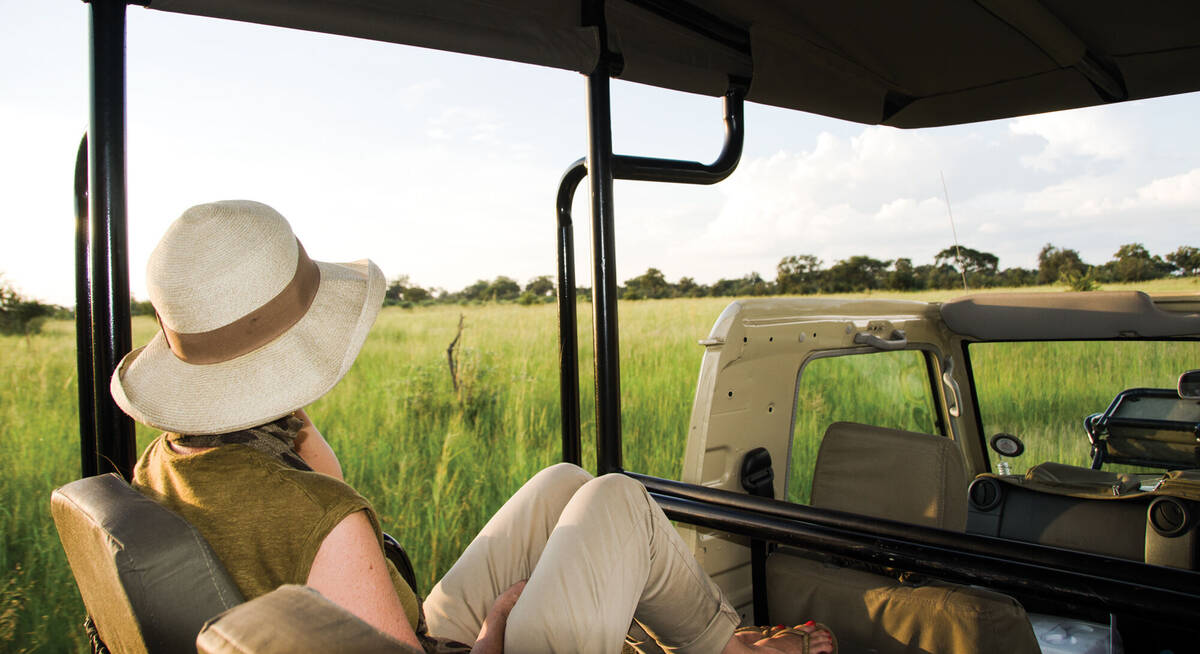
Rock Hare Self-drive Safari
20 days • 12 locations
WINDHOEK AIRPORT TO VICTORIA FALLS AIRPORT
An in-depth look at Namibia from the Namib Desert to the Caprivi, with additional stops in Botswana and Victoria Falls. This three-week adventure includes an unrivalled mix of environments and is great value.
US$7,230 - US$8,170 per person

Caracal Self-drive Safari
14 days • 8 locations
WINDHOEK AIRPORT TO WINDHOEK AIRPORT
The quintessential Namibian self-drive adventure exploring the highlights from Sossusvlei and the Namib Desert to Damaraland’s wilderness and a safari in Etosha. A great mix of accommodation and excellent value.
US$3,200 - US$4,010 per person

Dune Lark Fly & Drive Safari
14 days • 8 locations
WINDHOEK AIRPORT TO WINDHOEK AIRPORT
A combination fly-in self-drive exploration of Namibia, with quick, easy and scenic flights in and out of Sossusvlei before a classic road trip adventure of the country’s rugged north.
US$5,210 - US$5,600 per person
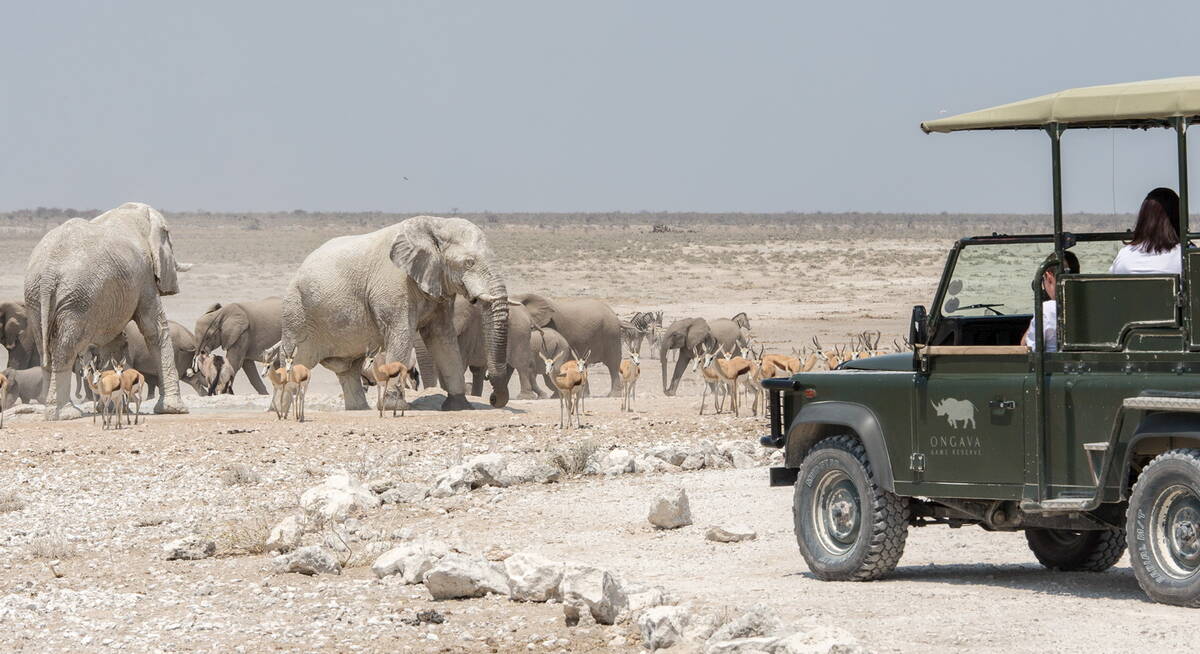
Brown Hyena Self-drive
14 days • 8 locations
WINDHOEK AIRPORT TO WINDHOEK AIRPORT
The perfect trip for those who want to mix the adventure and freedom of a self-drive with some of our favourite luxury camps in Namibia and a great mix of activities.
US$8,710 - US$9,610 per person
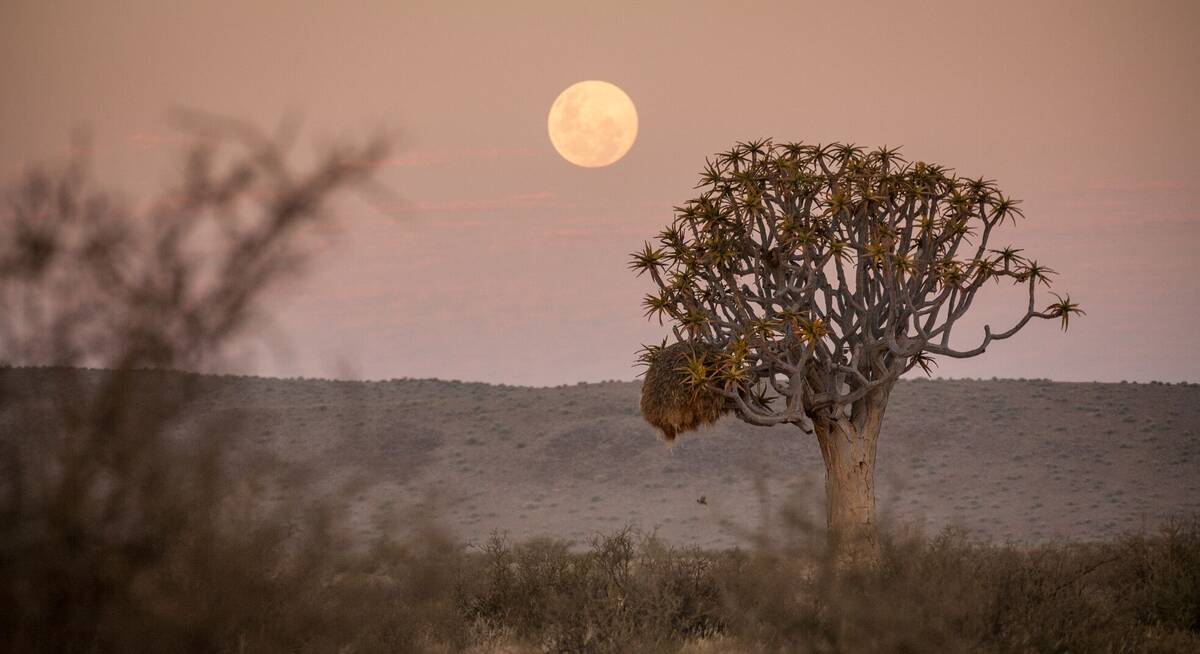
Quiver Tree Self-drive Safari
14 days • 7 locations
WINDHOEK AIRPORT TO WINDHOEK AIRPORT
An offbeat Namibian self-drive adventure exploring the epic Fish River Canyon and fascinating Kolmanskop ghost town in the south, before turning north via the classic highlights of Sossusvlei, Swakopmund and Damaraland.
US$3,370 - US$3,570 per person
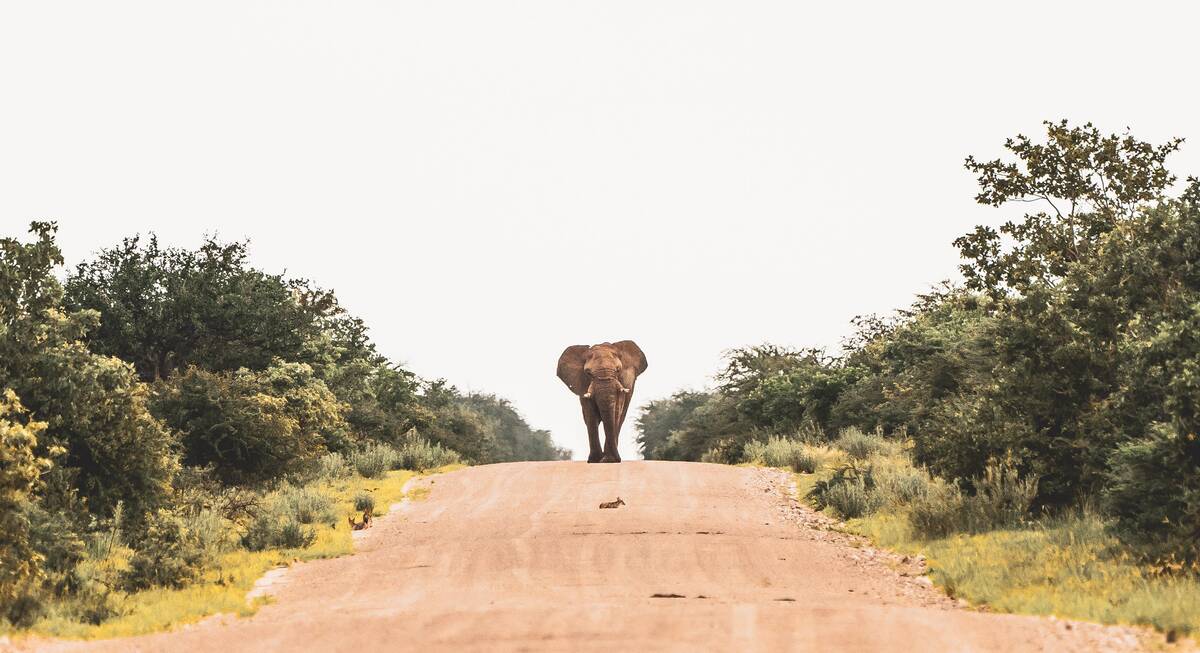
Black Wildebeest Self-drive Safari
19 days • 10 locations
CAPE TOWN AIRPORT TO WINDHOEK AIRPORT
Journey from South Africa’s cosmopolitan Cape Town to central Namibia’s Okonjima Nature Reserve during this self-driven safari. The route passes through a stunning variety of landscapes, offering access to this beautiful continent’s rich diversity.
US$4,030 - US$4,130 per person

Cape Fox Guided Safari
13 days • 7 locations
WINDHOEK AIRPORT TO WINDHOEK AIRPORT
A classic clockwise circuit around Namibia’s northern highlights with a private guide and vehicle. We can’t think of a better way to see more in this timeframe.
US$11,130 - US$12,960 per person

Black-faced Impala Guided Safari
13 days • 6 locations
WINDHOEK AIRPORT TO WINDHOEK AIRPORT
A unique mix of luxury and adventure in our original, and perhaps most varied, destination on a privately guided Namibian overland safari. Perfect for families, friends or couples travelling together.
US$13,020 - US$15,180 per person

Looking for inspiration on where to travel next?
Visit our trip chooser to explore your options and find inspiration for your perfect African adventure
Inspire me